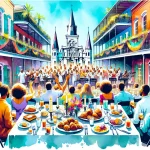New Orleans, a captivating city steeped in rich heritage and lively celebrations, beckons millions of visitors every year. While the city promises an unforgettable experience, prioritizing safety during your stay is paramount. In 2022, the New Orleans Police Department reported a commendable 28% decrease in both violent and property crimes compared to the previous year, thanks to enhanced deployment strategies and collaboration with law enforcement partners. Nevertheless, visitors should remain vigilant and acquaint themselves with local laws and safety tips to ensure a secure and enjoyable trip.
In This Article
TL;DR
- Maintain situational awareness, secure your valuables, and utilize official transportation services.
- Familiarize yourself with local laws and regulations regarding personal safety, alcohol consumption, and crime prevention.
- Exercise caution in popular tourist areas, choose secure accommodations, and have emergency contact information handy.
Understanding Local Laws and Regulations
Personal Safety Laws
In New Orleans, engaging in disorderly conduct, such as public intoxication, disturbing the peace, or loitering, is illegal. Visitors should also be aware that the legal drinking age is 21, and open containers of alcohol are only permitted in the French Quarter and during specific events like Mardi Gras.
Alcohol and Drug Laws
While New Orleans is renowned for its lively nightlife, it’s crucial to consume alcohol responsibly and adhere to local laws. Public intoxication and driving under the influence are strictly prohibited. The possession and use of illegal drugs are also against the law and can result in severe penalties.
Firearms and Weapons Laws
Louisiana has permissive gun laws, but it is illegal to carry a concealed weapon without a proper permit. Visitors should also note that firearms are prohibited in many public places, including bars, schools, and government buildings.
Staying Safe in Popular Tourist Areas
French Quarter Safety
The French Quarter is a popular destination for tourists, known for its historic architecture, lively music scene, and renowned restaurants. To stay safe, visitors should stick to well-lit and populated areas, especially at night. Be cautious of pickpockets and scams, and avoid carrying large amounts of cash or wearing expensive jewelry.
Garden District Safety
The Garden District, famous for its stunning mansions and lush gardens, is generally a safe area to explore during the day. However, visitors should still be mindful of their surroundings and avoid walking alone at night. It’s also wise to take a guided tour to learn about the neighborhood’s history and architecture while ensuring personal safety.
Riverfront and Park Safety
New Orleans’ riverfront and parks, such as Woldenberg Park and Crescent Park, offer beautiful views of the Mississippi River and a respite from the city’s bustling streets. When visiting these areas, stay in well-lit and populated sections, and avoid isolated areas, especially after dark.
Hotel and Accommodation Safety
Choosing a Safe Hotel
When selecting a hotel in New Orleans, opt for establishments in well-known, tourist-friendly areas such as the French Quarter, Central Business District, or Garden District. Read reviews and check the hotel’s safety features, such as secure entrances, surveillance cameras, and 24-hour front desk service.
In-Room Safety Measures
Once in your hotel room, ensure that the door and windows are securely locked. Familiarize yourself with the hotel’s emergency evacuation plan and the location of fire exits. Use the in-room safe to store valuables, or inquire about the hotel’s safe deposit boxes at the front desk.
Securing Valuables
When exploring the city, carry only the essentials and leave valuable items in your hotel room’s safe or the hotel’s safe deposit box. If you must carry valuables, keep them close to your body in a secure, hidden location, such as a money belt or hidden pocket.
Transportation Safety
Airport and Taxi Safety
When arriving at Louis Armstrong New Orleans International Airport, use official airport taxis or rideshare services like Uber or Lyft. Ensure that the driver’s information matches the details provided in the app before entering the vehicle.
Public Transportation Safety
New Orleans’ public transportation system, including streetcars and buses, is generally safe to use during the day. However, be aware of your surroundings and keep your belongings close to you. Avoid using public transportation late at night, especially in unfamiliar areas.
Rideshare and Rental Car Safety
If using rideshare services like Uber or Lyft, always verify the driver’s identity and vehicle details before entering the car. When renting a vehicle, choose a reputable rental company and familiarize yourself with local driving laws and parking regulations.
Avoiding High-Crime Areas and Situations
Identifying High-Crime Neighborhoods
While most tourist areas in New Orleans are relatively safe, some neighborhoods have higher crime rates. Visitors should avoid areas such as Central City, Hollygrove, and the Seventh Ward, especially at night.
Staying Safe at Night
If exploring New Orleans at night, stick to well-lit, populated areas, and avoid walking alone in unfamiliar neighborhoods. If you feel unsafe, trust your instincts and seek help from a nearby business or law enforcement officer.
Steering Clear of Scams and Pickpockets
Be cautious of common scams in New Orleans, such as the “shoe shine scam” or individuals offering to bet they can guess where you got your shoes. Politely decline these offers and keep walking. To avoid pickpockets, keep your wallet in your front pocket, wear a cross-body bag, and be mindful of your belongings in crowded areas.
Emergency Preparedness and Response
Knowing Emergency Numbers
In case of an emergency, dial 911 for immediate assistance from police, fire, or medical services. It’s also helpful to have the contact information for your hotel, the nearest hospital, and your country’s embassy or consulate readily available.
Seeking Help from Police and Authorities
If you experience a crime or feel threatened, report the incident to the New Orleans Police Department (NOPD) as soon as possible. The NOPD has a strong presence in tourist areas and works closely with local businesses and organizations to ensure visitor safety.
Medical Emergencies and Hospitals
In the event of a medical emergency, seek help from a nearby hospital or urgent care facility. Some reputable hospitals in New Orleans include Tulane Medical Center, University Medical Center New Orleans, and Ochsner Medical Center.
Protecting Your Belongings and Identity
Safeguarding Valuables
When out and about, keep your valuables, such as your wallet, passport, and phone, in a secure, hidden location on your person. Avoid leaving valuables unattended in public places or in plain sight in your hotel room.
Preventing Identity Theft
To protect your identity, be cautious when using public Wi-Fi networks, as they may not be secure. Avoid accessing sensitive information, such as online banking or personal email accounts, on public networks. If you must use an ATM, choose one located inside a bank or hotel lobby, and shield the keypad when entering your PIN.
Travel Insurance Considerations
Consider purchasing travel insurance before your trip to New Orleans. Travel insurance can provide coverage for medical emergencies, trip cancellations, and lost or stolen belongings. Read the policy carefully to understand the coverage and any exclusions.
By familiarizing yourself with local laws, staying aware of your surroundings, and taking proactive safety measures, you can minimize risks and fully enjoy your visit to New Orleans. Remember, the city’s hospitality industry, law enforcement, and local organizations are committed to ensuring a safe and memorable experience for all visitors.






